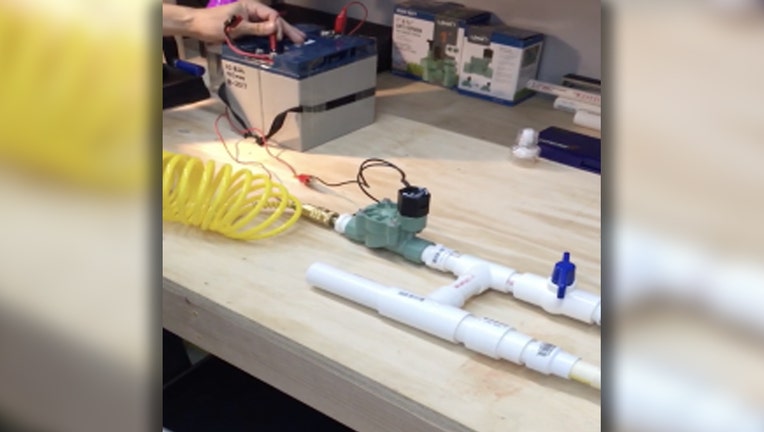UF researchers designing low-cost, 'open source' ventilator made from hardware store items

(Courtesy: UF Health)
GAINESVILLE, Fla. - A professor of anesthesiology at the University of Florida is building an "open source" ventilator out of common items from hardware stores, in an effort to meet the desperately high demand internationally due to the coronavirus pandemic.
Decades ago, Dr. Samsun Lampotang helped build a minimal-transport ventilator while he was a mechanical engineering student at UF. That ventilator became a commercial success, the university says.
Now he is working with researchers at UF to build a new prototype, using "plentiful, cheap components" that could be copied around the world.
Related: President Trump declares major disaster in Florida due to COVID-19
Lampotang sent his lab's lead engineer, Dr. David Lizdas, to Home Depot to buy a variety of items, including air-tight PVC water pipes and lawn-sprinkler valves.
Their mission: to "MacGyver" the items into an open-source ventilator that they will then make publicly available.
“The way I looked at it is, if you’re going to run out of ventilators, then we’re not even trying to reproduce the sophisticated ventilators out there,” Lampotang said in a university statement. “If we run out, you have to decide who gets one and who doesn’t. How do you decide that? The power of our approach is that every well-intentioned volunteer who has access to Home Depot, Ace or Lowe’s or their equivalent worldwide can build one.”
Related: Starbucks offers free coffee to healthcare workers and first responders during coronavirus pandemic
Lampotang is an inventor with 43 patents belonging to UF. However, he says he will not try to patent the ventilator. Instead, with UF's approval, he wants to provide it as "open source" for engineers and hobbyists across the globe to build in order to help curb the skyrocketing demand for the life-saving devices. UF says the machine can be built for as little as $125 to $250.
The team is working on adding safety features to meet regulatory guidelines. They will then run engineering tests to determine safety, accuracy and endurance.
“We want to reach the whole world, and The Gator Nation,” Lampotang said. “We have UF graduates from all over the world. There’s already a network of people who can contribute in disseminating the technology if it’s needed in the next few weeks.”
Related: Pennsylvania supermarket says coughing 'prank' prompts trashing of $35K in produce, other items
Beyond the coronavirus pandemic, Lampotang says he hopes the ventilator can be useful in the long run as well.
“When all this comes to pass and the world settles down, we hope it will be repurposed for use in underdeveloped countries, so they can build a safe and inexpensive ventilator for themselves,” he said.
For more information on the project, visit UF Health's website.
If you feel sick:
The Florida Department of Health has opened a COVID-19 Call Center at 1-866-779-6121. Agents will answer questions around the clock. Questions may also be emailed to covid-19@flhealth.gov. Email responses will be sent during call center hours.
LINK: Florida's COVID-19 website
CORONAVIRUS IN FLORIDA: What you need to know
AROUND THE WORLD: CoronavirusNOW.com
Map of known COVID-19 cases:
MOBILE APP USERS: Click here for map

